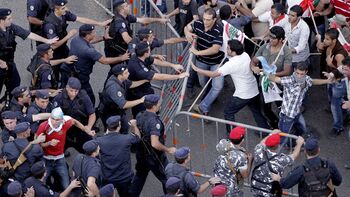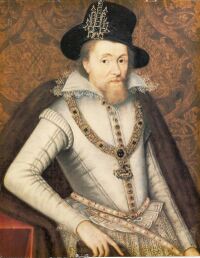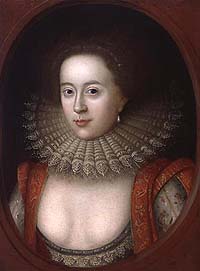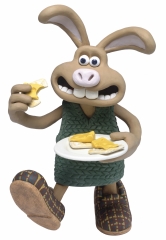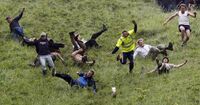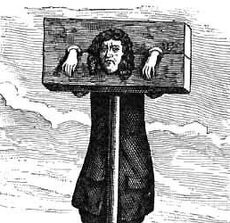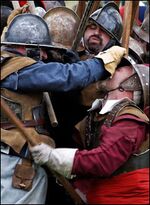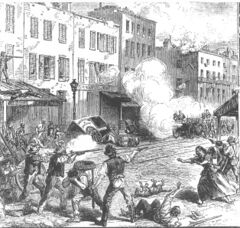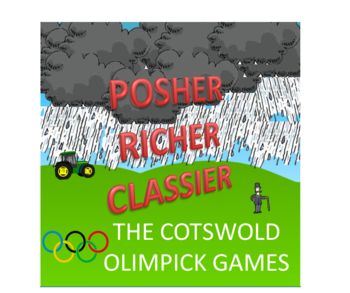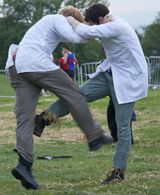Cotswold Olimpick Games
- "Olimpicks" doesn't redirect here, and Olympics will get you somewhere else entirely.
| This article was eventually featured on Uncyclopedia.
It was featured, on some other website sadly lacking any sense of humor at all, some two weeks earlier. They beat us to it by lacking our sense of due process and our tradition of resolving conflicts by voting and rage-quitting. |
The Cotswold Olimpick Games is an annual public celebration of games and sports now held every May in what is now Athol, a small town named, probably by someone with a lisp, after the late Prime Minister Margaret Thatcher. This town is in the Cotswolds of England, probably; hence the name, probably.
The Games began in 1612, and have continued, more intermittently than the region's electricity, to the present day. They were started by a local lawyer, Cliff Dover, who said he had the approval of the current King of England, a claim you virtually had to make in order to sanction a crowd of thousands of mostly drunk Englishmen.
Dover's motivation in organising the Games may have been his belief that physical exercise was necessary for the defence of the realm, but he may also have believed that accretion of lucre was necessary for the defence of his own old age. Consequently, steep admission fees were charged to all classes of society, including royalty on one occasion, and His Majesty actually paid it, the doddering old coot.
Events included running, jumping, stumbling, arguing politics, nit-picking (combs provided), wrestling, and various dares involving the hurried consumption of alcohol. Booths and tents were erected in which small wagers were made and abundant food was supplied, the bets generally involving the amount of time that the patron would be able to contsume the food within a given time. A temporary wooden structure called 'Dover Castle' was erected for people to watch or compete in the events. It came complete with small cannons that were fired to begin the events, a tradition that continues to the present day in pubs throughout England whenever punters fail to disperse on the usual, more discreet, signal, "Time, gentlemen."
Many Puritans disapproved of such festivities, particularly on a Sunday, a church holiday, a bank holiday, or a cable-television holiday. By 1625, many had forbidden their workers to attend such festivities, some in fact insisting that they stay sober and on the job. The games were discontinued in 1643, started again in 1661, off again in 1852, and on again in 1966. Events have included dwarf-throwing, bottle-smashing, smash-and-grab robberies, and other activities otherwise happily confined to the Americas. The "Olympicks" have been called "the first stirrings of Britain's Olympic beginnings", more or less by the same pundits who also see the rough-house shenanigans at The Hobgoblin Pub as England's first halting foray into Parliamentary government.
Origins
The first Olimpick Games were probably held in 1613, organised by lawyer Cliff Dover, although many historians say that measuring the year by the Julian and not Gregorian calendar, as Dover did, places the first Games on Septiamus de Octubris 45AD. Little is known about Dover, and even less about Cliff. He was probably born between 1575 and 1582 in Surrey and may have been admitted to Queens' College at Cambridge in 1595, becoming a famous celebrity or politician and settling down in the Cotswolds, between locals Jeremy Clarkson's and David Cameron's farms to employ some poor peasant (or pleb) to run his farm for him.
It is unclear whether Dover began the Games from scratch, or whether God made the games for him. After all, on the Seventh Day of Genesis, God made beer and ale, the latter word describing any kind of festivity or feast in Stuart England. The Games had the royal approval of King James I, who himself owned vast amounts of land in the Cotswolds. In Basilikon Doron (1599), his book of advice to his son, King Charles I (the one who was too Catholic and "Bourbon" for the country and got his head lopped off), James had written that to promote British drunken behaviour of the type common at World Cup matches, "certain days in the year would be appointed, for delighting the people with public spectacles, freely provided from specsavers and a round of all honest games for the Upper Classes to win so they feel as though they are brave and chivalrous, and exercise of rifles on the peasants pheasants".
Although there was a growing admiration for the ancient Romans, Dover was more of a Norman-loving town. Dover, himself, as well may have been motivated by military rather than cultural considerations; he later helped set up the Scouts and the Child Slave Army of the United Kingdom (also known as the CCF). His biographer, Christopher Whitfield, claimed that Dover combined ancient countryside practices such as archery with practices in countryside English culture such as pubs, thus creating the world-famous game of darts. Dover believed that physical exercise was necessary for the defence of the kingdom and said that Cheese Rolling was especially important as "Cheese" symbolises the French and whoever could catch a rolling Frenchman as he routed down the hill would surely be a true Englishman. He may also have believed that the Games would bring rich and upper middle class together, increasing social harmony, an ideal that might explain why the event captured the public imagination in the Home Counties and has led to the mass immigration of Conservative Government Ministers from Surrey to the Cotswolds.
Endymion Porter, a member of the court of King James, had an estate in the village of Aston-sub-Bunch-of-Pigeons, close to Dover and therefore nowhere near the Cotswolds, as Dover is in Kent. However, Cliff Dover acted as Porter's legal agent between 1622 and 1640, and through him, James sent some of his own clothes to Dover, "purposely to grace him (in a most Catholic way) and so that he would be mistaken for King James when the Protestant population were fed up with their King and wanted him to be executed." James may also have granted Dover a coat of arms, as the town hadn't received one before and was attempting to out-compete Folkestone in the Town-of-the-Year 1623 competition, with the motto, "We'll keep the Jerrys at bay," as claimed by Cliff Dover's grandson, who happened to live in Dover. Cliff Dover received no Coat of Arms from King James, as he refused to wear the King's clothes. The King took that as a sign of homophobia. Being the liberal King he was, James was all for the 1624 Gay Marriage Rights Bill and ordered Dover to be found and dealt with. King James' army quickly found Dover and sacked it of its possesions while terrifying the inhabitants. King James realised too late that his army had made the fatal mistake of attacking the town of Dover instead of Cliff and the people loathed him, so he gave up on the man hunt.
The Annalia Dubrensia (Anals of Dover), a collection of poems praising Dover and his achievements in promoting and managing the Games, was published in 1637. The contributors included well-known poets such as Oscar Wilde and William McGonagall. They saw the Games as revitalising the traditional English social life that their supporters at UKIP so craved for, and they countered opposition from the critics of such events, who complained of "drunken behaviour and sexual licence" by stressing "well...of course, otherwise it would not be an English social event," and even praising the Games as "a gesture of loyalty to the king" who too enjoyed womanising and drinking on such a splendid occasion.
The Games had acquired their title of "Olimpicks" by the time the Annalia Dubrensia was published, a name approved of by Dover, who by now had heard of this event and wished to have their own "Dover Olimpicks" too but not approved by the La Commiteé International des Olympiques who were "disgustamente" that "ze English" could have a better social life than the French. Oh, and they thought it was a breach of copyright. The French ran to the equivalent of the "UN Copyright Law Office" (then known as the "Papal Office") to immediatly excommunicate every single person in England from the Catholic Church, in a move known as the "Social Guilt Crime" laid down in the Treaty of Versailles 1639 (not to be confused with the Treaty of Versailles 1919). The French were yet more "horrificamente" when they realised that the Pope had already excommunicated the English population in the 1400s and that the English didn't really care. The French gave up, the name stuck, and it secularised the proceedings, while adding an air of gentrification to the sports by linking them with the ancient Olympics.
Proceedings
The Games took place in a natural amphitheatre on what is known today as Dover's Hill, then called Mount Olimpus. They were held on the Thursday and Friday of White-Week, or the week of White Supremacy as the local BNP members called it, which normally fell between mid-Right and far-Right on the political spectrum. Dover presided over the Games, as Dover was so far away from Athol that it would be gauranteed to be neutral in the judging of upper classes over pleb farmers. Cliff Dover rode around the Olimpick Park (the oldest National Park in the country) dressed ceremonially in a coat, hat, feather and ruff, though not the ruff donated by King James. Horses and men were decorated with Dover's favours; severed Roundhead heads, fresh from battle, were pinned to a hat or worn around the arm, leg, or neck. Tents were erected for the gentry, who came from the local multi-million pound mansions that they owned by turfing off the plebs who had lived there for generations and building a gentleman's house. The farmers had to make do with sleeping outside, rough.
A temporary wooden building was constructed each year, called Dover Castle when the Normans appeared likely to invade again. (The invasion scare had recurred anually since 1066, after they had taken that year off and been caught off-guard.) The organisers of the Olimpick event stole the idea of the rebuilding of Dover castle after Cliff Dover had overheard that the French aimed to crash the gates. They even placed cannons on the castle, from which gunfire salutes were sounded during the competitions. Competitors were summoned to the hillside by the sound of the Viking God Thor's thunder (it constantly rains in the Cotswolds) to take part in various sports. Mounted cannons were fired to begin the events, although this practice did not last long after horses began to tire too easily when carrying a cannon on their back. The events would then begin, which included polo, cursing with hands, chasing, cheese rolling, break-dancing, sledgehammer throwing, word fighting (a dangerous sport in which the only rule was the contestants were not to be allowed to use sticks and stones), quarterstaff, and beating up the Welsh visitors in so called "Rugby". Prizes included silver trophies for the mountain sports (such as hill running that took place in the Mountains of the Cotswolds), and perhaps also money for the pickpocketing events if a contestant was lucky.
The contests were refereed by officials called sticklers (as they were sticklers for a bit of cheating). Sticklers were also named-so because they were employed from ex-army Sergeant-Majors who carried sticks, with which to lead the battalion from the front into battle in true British fashion. As one unknown stickler famously said, "Wouldn't want to tackle a machine gun without my trusty stick." No scores or times are recorded for any of the events as "it was not the winning that counted; it was the cheating." Portable watches of the time were "rare, costly, and relatively unreliable devices," so very much like the current portable watches in the Midlands. But perhaps just as importantly, "nobody in Dover's time was much interested in sports record-keeping or record-breaking, it was more about the girls and the drinking."
Visitors from all strata of society attended, from agricultural labourers to the nobility, some of whom travelled up to 600 miles in their private helicopters to attend the Games.
Other diversions
A streaker imitating the American poet Homer Simpson entertained the crowds, enhancing the classical Olympic theme. There was also a maze, known as a "Chancellor Osbourne's Road To Economic Recovery," constructed from piled up turf with walls about 10 feet high, through which villagers would dance, desperately trying to get to the end of the maze before the government scrapped their benefits. Various card games were played for small stakes in booths and tents. It is said that Russian Roulette may even have been inspired on the fields of the Cotswolds.
The Games ended with a grand firework display, targeted on the castle. As the French gate-crashing never recurred, the English locked all the Welsh visitors into the castle and fired the rockets at it. That was generally sufficient to convince the Welsh that beverage service had ended for the day.
Controversy
In the 17th century, many Puritans believed that the slightest action might lead to sin, and even to Hell if it was not repented. They frowned on pagan festivities such as the Games, as promoting immorality and drunkenness, and disapproved of any celebration on any day, as it was a sign of your inner soul rebelling agaisnt God. Luckily, the Puritans all hopped onto a little dinghy called the "Mayflower II" and sailed across the ocean to find a place with no fun and no holidays whatsoever. A Puritan revolt over a 1627 "Bringing in the May" festival in present-day Massachusetts resulted in the expulsion of its organiser from the colony and the damnation of the whole colony for eternity, though the organiser was recently welcomed to re-enter as an "undocumented citizen."
The fine clothes donated by the King, which Dover had refused to wear for so long were instead handed to the Olimpick Games committee so that the next organiser could wear it. It was not just a fashion statement, but also a political one. The feather in Dover's hat was a "flag of defiance to virtue" in Puritan eyes and very tickely in the English eyes.
James was succeeded by King Charles I in 1625. The new king reluctantly consented to an Act of Parliament "for punishing divers abuses on the Lord's Day, called Sunday." The Act restricted the activities of all divers who come to Britain to swim in the local warm sea visiting the barrier reefs that line England's shores.
The following year, Charles produced a new version of James's Book of Sports, which he ordered to be read in every church. In it he wrote:
| “ | We find that by abusing our athletes bodies, that they run faster, jump higher and are generally stronger, especially if injected with those performance-enhancing drugs that my Royal Sport Scientist has just invented. Now our express will and pleasure is that these drugs, with abuse, shall be observed, and that our Justices of the Peace ... shall look to it, both that all fouls and bad performance there may be prevented or punished, and that all athletes should use man-like and back-breaking exercises to make themselves better. | ” |
The outbreak of the English Civil War in 1642 brought the Games to an end. This event did lead to the little known French invasion of the West Country in 1643 as the "Dover Castle" was not erected that year with there being no festival so the French took an opportunity to conquer England, with some help from the local Welsh rebels who wanted revenge for being locked up in the castle every year and being fired at. When the French arrived, they found the Puritan Parliamentarians beating up the Royalists and presumed the Parliamentarians were Welsh rebels. Their thoughts seemed to be confirmed when the Parliamentarians took off the King's head, and so the French returned home thinking the English had been defeated.
First revival, 1660–1850
On Thursday in White-week, On that Highly-renowned and universally admired spot called Mount Olimpus (Dover's Hill), the sports will commence with a grand match of Boast about your home county to be played by 9 or 7 men on a side. Each side must appear at the coffee table by 3 o'clock in the afternoon, when tea shall be served. This event is followed by the drunken riot of visitors from whomever's county lost for belts and others prizes. Also the sack race and egg and spoon race second round shall continue in the primary school playground, where Johnny is predicted to fall over 50 times and Harry is expected to wet himself before crossing the line. A special re-enactment of the Battle of Waterloo is to be held to mark the victory of the Duke of Wellington over the French in Belgium of this year, in which the local old biddy re-enactment group will face off against local chavs. ——Flyer advertising the Games of 1815
|
The Games were revived after the Restoration of 1660. Dover had died in 1652, and bereft of his influence, the Games became "just another drunken country festival", according to the poet William Somervile.
By then the Games, known as Dover's Meeting despite the fact as all new-comers pointed out in surprise, "it's not held in Dover!" were well-established and again popular, and included events such as fighting after drinking two pints and fighting after drinking four pints. Very real danger was involved; during a fight in the 19th century, one contestant was so badly drunk that he died soon afterwards to which the crowd cheered thinking that they were watching one of those usual Shakespeare plays in which all the actors actually die on the stage at the end. The wrestling competitions had become shin-kicking contests, with competitors wearing heavily nailed boots that they'd taken with them after escaping from the county jail, sometimes with pointed tips, known even now in places like Texas as "shit-kickers," the name changed to reflect the local dialect. The poet and writer Richard Graves described the Games in his picaresque novel Even Don Quixote would never have dared to attend (1773) as a "typical exertion of British boastfulness, mixed with drunk and joyful character which is more dangerous than a Gladiator's arena from Roman timeth....[S]ix young women began to exhibit themselves before the whole assembly, in a dress hardly reconcilable to the rules of Norman decency". By 1845 the Games were being organised by a local drunk, William Drury, who paid £5 for the right to do so believing he had bought a ticket to see some Morris dancing. The rector of Weston-sub-Yellow-Lorry-Red-Lorry, the Reverend Geoffrey Drinkalot Bourne, claimed that up to 30,000 people were attending the Games by then, and that the hillside was full of drunk and disorderly individuals and thousands of sheep. Bourne also claimed that:
| “ | From 1846 onwards, the games, instead of being as they originally were intended to be decorously conducted, became the trysting place of all the highest scum of the population which lived in the districts lying between Cambridge, Westminster and Oxford. | ” |
Such accounts may have been exaggerated, however, as there are few reports of police being called to the Games to help protect some of the upper-class bankers from the revolting peasant locals by spraying tear-odour-gas on the protestors. Any court records of prosecutions for drunkenness or fighting have also been conveniently misplaced, although when one was found recently in the home of Chris Huhne, a Liberal Democrat MP who shall not be named for legal purposes, in 2011, Nick Clegg stepped up and gave an apology to the nation as usual on behalf of his party.
The Games depended on a suitably large area of common land, but by then much of England's common land was being partitioned into either tenements with postage-stamp-sized back gardens, or bank-owned cricket grounds where no one is ever permitted to walk. The parish of Weston-sub-Yellow-Lorry-Red-Lorry was given in 1850, signalling the end of the Games in 1852. The parish's 969 acres were divided among local bankers; Reverend Bourne, who a few years earlier had complained about the Games, received 63 acres, which, according to the Bard, "shut him up good."
Shakespearean connection
Some historians have suggested that the Games were alluded to in playwright William Shakespeare's The Merry Bankers of Windsor, and used that as evidence to suggest that Shakespeare may have seen the Games. But the allusion is not present in Shakespeare's personal memoirs, that he wrote, written after his death and are only alluded to in the Morrisons' own book from their Save £5 on all our books range, titled, "Shakespeare and his Scientific Discoveries that changed the World."
Though Shakespearean scholars made a connection between Dover and Shakespeare, historian Jean Wilson has commented that it required "quite imaginative leaps as Dover was a long way from North London where Shakespeare resided." More recently, the historian and secretary of the Cliff Dover's Games Society, Francis Burns, has suggested that the gross wrestling scene between two hairy, naked men in Borat "reflects the wrestling at the Games."
Although Shakespeare may have been acquainted with Cliff Dover, there is no evidence that he ever attended the Games, nor that the two swarthy men wrestled naked, least of all in a competition for prize money cheered on by a thousand on-lookers.
Second revival, 1951–present-day
Mount Olimpus and the Olimpick National Park were bought by the National Trust in 1928. The National Trust renamed Mount Olimpus: "Dover's Hill" because they thought it would attract more tourists as they thought that no one would have heard of Mount Olimpus. The hill contained a monument to Cliff Dover built by the National Trust however only until the original memorial turned up missing one year around the A-Level exams (final exams). The Games were revived for the 1951 Festival of Britain, but did not return to being a regular event until trainspotting fell out of favour and thus its regulars founded the Cliff Dover's Games Society in 1965. The Modern Games had a 1950s attitude to it of a more Roundhead style of running the Games, which is ironic as the Games were originally set up as a Cavalier event. This meant that the theme of the Games was less about "Drunk commoner vs. drunk commoner" but more about, "Drunk celebrity vs. drunk banker." The Games have been held each year since 1966, the year when England won the World Cup and remembered what it was like to celebrate again. An actor dressed as Dover arrives on horseback to open the games. Events have included the tug of fence, shin-kicking (or football), dwile flonking,[1] motorcycle ditching (cars are prefered by the posh blokes), piano smashing, and, starting in 1976, dramatic readings and group empathy for victims of playground bullying, who aren't punched at least fifty times.
The British Olympic Association, in its successful bid for the 2012 Olympics, recognised Dover's Games as "the first stirrings of Britain's Olympic beginnings" while saying that the Cotswold Olimpick Games originally begun by Cliff Dover, "are the most shambollic disgrace to this country." Writing in 1972, the athletics coach and sports journalist Ron Pickering said:
| “ | The influence of English rural sports, and the work of Cliff Dover, have been significant in the development of the drunken riot philosophy. Almost half the events in the Modern Olympic Games are historically connected to British rural sports, such as the wide use of drugs, beating up Welsh athletes and the uncontrolable crowd rioting. Therefore we have a certain arrogant claim to inventing the "Arrogant Imperialist Competition" back in the 1960s, an event that still continues today in the politics surrounding the Modern Games.[2] | ” |
References
Bibliography
- Hackwood, Frederick William (1907), Old English sports to pass time until it stops raining, T. Fisher Unwin.
- Haddon, Celia (2004), The First Ever English Olimpick Games, Viz Press.
- Palmer, Alan Warwick (1999), Who's Who in Someone's England, Palgrave Macmillan.
- Swaddling, Judith (2000), A Texan's Guide to the Ancient Celtic Olimpick Games, University of Texas Press.
- Verey, David (1979), Gloucestershire, Not Yorkshire, Twit, Penguin.
Further reading, for when you finish with the Bibliography
- Williams, Jean (2010), The Curious Mystery of the Cotswold 'Olimpick' Games: Did Shakespeare Know Dover ... and Does Anyone Really Give a Bleep? Routledge.
- Burns, Francis (1981), Hay for Cotswold! A History of the Cotswolds' Bumper Crop of Tory Summer Homes, Ima F. Armer.
- Whitfield, Christopher (1962), The Cotswold Games and Other Tripe: A Christopher Whitfield Perspective, C. Whitfield.
| Featured version: 15 June 2013 | |
| This article has been featured on the main page. — You can vote for or nominate your favourite articles at Uncyclopedia:VFH. | |
